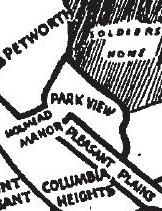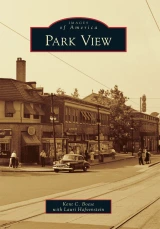As part of Parking Day on Friday, September 21st this year, DDOT constructed a temporary pop-up bike lane on the 400 block of Kenyon Street, NW. This was an extremely valuable experience as DDOT is looking at ways to incorporate a permanent protected bi-directional bike lane on Irving Street between Michigan Avenue, NE, and Warder Street, NW. The temporary bike lane on Kenyon offered a good opportunity for DDOT to get feedback from residents as well as watch how traffic adjusted to accommodate the lanes.
Overall, I believe the bike lane pop-up was a success due to the information learned to help inform the next steps. As expected, comments related to DDOT’s plans are mixed, with some strongly in favor and others opposed. In addition to making Kenyon one lane during rush hour, some are concerned that a protected bike lane will reduce on-street parking. All of this would still need to be worked out.
Although, based on the boards that were shared with the community, it does appear that there is room for protected bike lanes, bump outs for new trees on Warder Street, and new parking along Park Place IF the suggestions proposed by DDOT meet with approval. Its difficult because every opportunity is accompanied by a trade off.
 (Discussing the crosstown protected bike lane project with DDOT during the pop up event.)
(Discussing the crosstown protected bike lane project with DDOT during the pop up event.)
Bump Outs
I was really exited to see that DDOT has been paying attention to much of what I’ve been suggesting over the years, especially with regards to incorporating bump outs on Warder Street to create new locations for street trees. See plan below.
 (Proposal to incorporate bulb outs on Warder Street, creating areas for new trees.)
(Proposal to incorporate bulb outs on Warder Street, creating areas for new trees.)
In DDOT’s proposal, they suggest 11 areas where bump outs could be created. But, this would remove 20 on-street parking spaces. As it is, the bike lanes may also reduce on-street parking spaces. This is a difficult trade off considering that demands on parking are increasing rather than decreasing. I’ve already met with the members of the project team at DDOT’s offices to review the plans and will be going over them block-by-block to see if there are missed opportunities or better locations for bump outs, and hope to get an initial survey completed before the end of October.
Potential Increase in Parking
In order to counter balance the impact on parking along Warder and Kenyon, DDOT is looking at the possibility of placing parking on both sides of Park Place, NW.
 (DDOT’s updated plan showing parking on both sides of Park Place, NW)
(DDOT’s updated plan showing parking on both sides of Park Place, NW)
The benefits of placing parking on both sides of Park Place would be that cars in addition to bollards would help protect the bike lane along the Soldiers’ Home. Additionally, it would reduce Park Place to a single travel lane, greatly reducing the speed of traffic along the street which has long been a problem. It would also increase neighborhood parking by more than the spaces lost elsewhere due to other aspects of the project. The biggest negative would be that it would limit the vista of the Soldiers’ Home along Park Place.
While there is much to consider, DDOT is still working to get to a 30% plan by the end of the year, and presuming the development of a winning plan, implementation by the end of 2019 at the earliest.
To help the community get more information and provide more feedback, I’ve invited DDOT to be the guest at the November meeting of the Park View UNC. That will give them time to incorporate the feedback they receive during their pop-up trial last Friday.





![IMG_9956[1]](https://parkviewdc.files.wordpress.com/2015/12/img_99561.jpg?w=450&h=338)






 "The territory comprising Park View extends from Gresham Street north to Rock Creek Church Road, and from Georgia Avenue to the Soldiers' Home grounds, including the triangle bounded by Park Road, Georgia Avenue, and New Hampshire Avenue" (from Directory and History of Park View, 1921.)
"The territory comprising Park View extends from Gresham Street north to Rock Creek Church Road, and from Georgia Avenue to the Soldiers' Home grounds, including the triangle bounded by Park Road, Georgia Avenue, and New Hampshire Avenue" (from Directory and History of Park View, 1921.)
